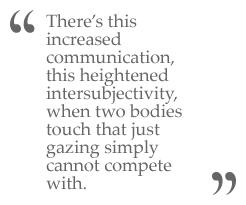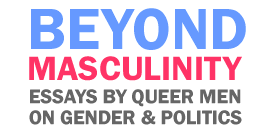|
 Really, I had to be put in an environment where people
of color asserted their sexuality more clearly through
their image and their expression. Like a Latin dance
club, or maybe a Persian wrestling match. It’s not
entirely possible for someone to change their
sexuality—but I think it’s possible for someone to
discover a new part of it when they find themselves in a
new context. When slowly I noticed being fond of certain
“other colors” too, I became more comfortable with my
sexuality. And I still resist the white Adonis sort of
aesthetic, if only because I think that somehow gives
away too much power. I need to retain control over my
gaze in this particular arena. It’s a difficult, ongoing
process, but an important one. Really, I had to be put in an environment where people
of color asserted their sexuality more clearly through
their image and their expression. Like a Latin dance
club, or maybe a Persian wrestling match. It’s not
entirely possible for someone to change their
sexuality—but I think it’s possible for someone to
discover a new part of it when they find themselves in a
new context. When slowly I noticed being fond of certain
“other colors” too, I became more comfortable with my
sexuality. And I still resist the white Adonis sort of
aesthetic, if only because I think that somehow gives
away too much power. I need to retain control over my
gaze in this particular arena. It’s a difficult, ongoing
process, but an important one.
Even though the appearance of sexualized bodies can
sometimes be intrusive, it can also sometimes be
welcome. Like when you go watch the Bourne movies simply
because Matt Damon is cute. There is certainly a time
and a place for attraction. But even then, I feel a
certain level of discomfort with my gaze. The reason
that I don’t always want to gaze at sexualized bodies is
that my eyes can not touch. Looking at people—but not
touching them—seems rather prohibitive. I’ve always
thought that museums suck for precisely this reason. I
want to touch all the exhibits! I want to touch the pots
and the paintings and the spectators—and even the museum
guards. I’d be much happier sometimes, I think, if I
were able to close my eyes and feel my way around the
mess of bodies that I lived among. There’s this
increased communication, this heightened
intersubjectivity, when two bodies touch that just
gazing simply cannot compete with.
Looking Forward
We all struggle with our sexuality at times. Gay or
straight, male or female, black, white, brown, green or
fuchsia. But it’s a particularly interesting puzzle,
this question about how the act of looking at someone
sexually can be unwelcome or desirable for either party.
What gets really complicated is when we try to take
control of our desire by controlling our gaze—by
choosing to look away. As I’ve tried to discuss, and as
I continue to learn in my life, there are merits to this
approach. And then there are times, as in Paris, when
you want to push someone just to have them look at you
in the face.
I no longer wonder why some women feel objectified when
men stare at them—because I realize that their
experience is so vastly different from mine. They suffer
from a real overdose of attention, whereas I have often
wondered whether it’s even safe to look at a man with
any hint of interest. That difference in being able to
look is a fundamental inequality between hetero society
and queer society. I can understand what some feminists
tried to argue when they called the gaze a weapon, even
as I see that it applies very little to my experience.
Moving forward from that line of argument, I feel we
should understand the gaze not always as a masculine
weapon, but as one way of initiating other kinds of
sensual communication, whether sexual or not. What I
come away wondering is, in the future, as images of
queer people become more mainstream, and images of
non-white queers become more sexualized, will we always
be willing to follow our gaze because we’ll be
comfortable with whatever it is we’re attracted to? I
don’t think it will be quite so linear. Self-doubt and
jealousy will probably still constrain the eye’s path,
but I think more individuals will be able to take
pleasure from their gaze and more people will take
pleasure in being seen. Let’s just hope we don’t
overdose from all that attention.
|




7 COMMENTS ON THIS ESSAY:
Thank you for writing about my blog and for linking to it.
That was a very thought-provoking article and parts of it definitely rang true for me as a gay man taking feminist classes. Thank you.
excellent article that rings true for me in so many ways. thanks for writing it.
I've read about 70% of the essays here, and this is my favourite due to its academic & philosophical basis.
Meaningful and precise reading about gaze and objectification is hard to find. Texts on gaze/objectification (=G/O) may be interesting but are often inspirational discourses without scientific foundation. Comforting warm air with good intention.
What we need is personal and societal development towards personal and mutual insight, accept, trust, sharing, UNDERSTANDING, knowledge, wisdom and compassion. (Yes, there is buddhist inspiration here.)
The fortune of UNDERSTANDING:
The simple truth "It's all in the mind" makes good foundation for a progressive awareness of a G/O process. We need have both the freedom and responsibility to remember that our impressions, perceptions, thoughts, (re)actions are ultimately our own choices.
Most will easily agree that (re)actions should better reflect informed choices rather than be rushed or instinctual. Few however trust that also impression, perception and thought are actually "chosen" options. If however you accept the fact that "society" somewhat conditions your impression, perception and thought, you're already halfway towards realizing that they ultimately rest on personal choices - however petrified the current pattern of impression, perception and thought appears to be - in a person or within a group.
Keep this in mind always and everywhere. Read this once again perhaps. All in the mind and all own choice.
Use this essence as guide to walking the fine line BETWEEN mindfully experiencing visual impression - AND - experiencing the thoughts and emotions appearing after. Perfection here includes seeing your rising desire. Then come thoughts and mental reflections. The sequences of your mind. You may feel insecurity? Fear of upsetting the object perhaps? Rejection? Stop for a moment!
Remember it's all in the mind. Our minds may stick looping endlessly in the warm air of mental imaginery - or just plain ignorance. Stupidity actually. Invalidated by habit and influenced by others without clear insight we need to look at the root. Our choice.
Choose between seeing and labeling. Between experience and expression. Between sharing and demanding. Between feeling and craving. Between loving and being loved.
Mr. Dorm Hunk is your label. It's your eyes that facilitate your visual impression. Your mind experiences your pleasure, desire, insecurity, fear and so on. Please cleverly separate and understand these ingredients and assume full responsibility for applying your awareness.
The visual impression may induce pleasure. You may stop and just enjoy. Or you may not feel satisfied. You want more. A second glance. You are aware of your desire. You chose to look again. It's fear that keeps you from doing this openly. Your fear. Or perhaps consideration for the object. You imagine Mr. Hunk Dorm may suffer if noticing your signs of joy. Or become upset. All in your mind. Your informed choice remains: decide what you want and possibly act.
In this life we are endowed with senses. Some even with a bit of wisdom. Very important knowledge about good and bad. How to avoid causing suffering. How to promote peace and happiness. Few acquire peace and happiness once and for all. Most however want to contribute. Thats compassion.
Our divine human potentials are best served through recognition, trust and respect. Not through blockages, stiff conventions or by veils. Recognize, trust and respect an attraction. Feel the feeling. Let it be. Rest there. Take time. Grasping for rewards or a reaction from Mr. Hunk Dorm is compassionately better avoided. Actively offering him your loving admiration is preferable. You need to train in expanding trust and confidence. Trust that both you and Mr Dorm Hunk have wish, capacity, and responsibility to mindfully cooperate in the respectful sharing of experiences.
Trust that ultimately it's all about love. Your divine potential. His too.
Contribute with your expressions of love and appreciation - avoiding attachment or grasping for more.
Will there be disappointments? Yes.
Because you have attachment to pleasure. Not to insecurity, fear, rejection and suffering.
Something meaningful will fall into your basket. Maybe Mr. Dorm Hunk will get his experience of joy too.
While there is diversity within the GLBT community, there is also camraderie based on the similarities. I do find that there is a gaze, a technique of staring, which many gay men, at least, use to identify each other. For me, it is an almost primal signifier of somebody of the same "tribe", as it were. A sort of shibboleth.
excellent. Not only intellectually stimulating but also a very thoughtful and generous piece. Rings true for so many, myself included.